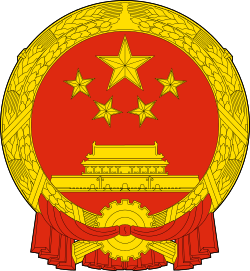China–Iraq relations
 |
|
China |
Iraq |
|---|---|
China–Iraq relations is the bilateral relationship between China and Iraq. Relations between both countries still remain very close and friendly.
History
Chinese Muslims fought against Japan in World War II. In order to gain backing for China in Muslim countries, Egypt, Syria, and Turkey was visited by Hui Muslim 馬賦良[1] Ma Fuliang and Uyghur Muslim Isa Yusuf Alptekin in 1939.[2] The Hindu leaders Tagore and Gandhi and Muslim Jinnah both discussed the war with the Chinese Muslim delegation under Ma Fuliang while in Turkey İsmet İnönü met with the Chinese Muslim delegation.[3] Newspapers in China reported the visit.[4] Ma Fuliang and Isa were working for Zhu Jiahua.[5]
The bombardment of Chinese Muslims by the warplanes of the Japanese was reported in the newspapers of Syria. Afghanistan, Iran, Iraq, Syria, and Lebanon were all toured by the delegation. The Foreign Minister, Prime Minister, and President of Turkey met with the Chinese Muslim delegation after they came via Egypt in May 1939. Gandhi and Jinnah met with the Hui Ma Fuliang and Uyghur Isa Alptekin as they denounced Japan.[6]
Ma Fuxliang, Isa Alptekin, Wang Zengshan, Xue Wenbo, and Lin Zhongming all went to Egypt to denounce Japan in front of the Arab and Islamic words.[7]
Relations between Iraq and China were established after the revolution of 1958 which overthrew the monarchy and established a republic. Relations between the two countries were formally established on August 25, 1958.[8] During the 1960s relations between the two countries were strengthened as Iraq had purchased many Soviet and Chinese weapons during the Six-Day War and the Yom Kipur War with Israel. But also during this time there was chaos because the Iraqi government had gone through several military coups and attempted coups. In 1971 Iraq supported China's bid for a permanent seat in the United Nations and it voted in favour to admit Beijing and replace Taipei.[9] During the Iran–Iraq War from 1980 to 1988 China was one of the main suppliers to all sides in the war. In fact, China had played both sides during the war and had sent arms to both Iran and Iraq.[10]
During the Persian Gulf War of 1991 China had condemned Iraq's invasion of Kuwait and had strongly supported the military action by the Coalition. But after the Gulf War China was found by American officials to have violated the United Nations Resolutions on the Gulf War and that China was beginning to rearm Iraq[11]
Recent history
China had strongly opposed the 2003 Iraq War and along with France, Germany and Russia had strongly condemned the invasion and occupation and had called for a withdrawal of all forces from the country. All four countries united against the United States and the United Kingdom and had refused to contribute any troops to Iraq unless there was a United Nations mandate.[12] Despite the opposition to the U.S. invasion and occupation of the country China emerged as one of the biggest winners of Iraq's oil contracts. Chinese and Russian companies had emerged as the biggest winners in the bid for Iraq's oil. Chinese companies were willing to operate on 20 year fee based contracts, which offered lower profit margins than Western companies desired.[13]
In 2013 China bought nearly half of Iraqi oil production, nearly 1.5 million barrels a day.[14]
See also
References
- ↑ Hsiao-ting Lin (13 September 2010). Modern China's Ethnic Frontiers: A Journey to the West. Routledge. pp. 126–. ISBN 978-1-136-92393-7. http://wenku.baidu.com/view/b09c1314a8114431b90dd89a.html?re=view
- ↑ Hsiao-ting Lin (4 August 2010). Modern China's Ethnic Frontiers: A Journey to the West. Taylor & Francis. pp. 90–. ISBN 978-0-203-84497-7.Hsiao-ting Lin (13 September 2010). Modern China's Ethnic Frontiers: A Journey to the West. Routledge. pp. 90–. ISBN 978-1-136-92392-0.Hsiao-ting Lin (13 September 2010). Modern China's Ethnic Frontiers: A Journey to the West. Routledge. pp. 90–. ISBN 978-1-136-92393-7.
- ↑ http://www.huizu360.com/huizu/news_view.asp?tid=5&id=19276
- ↑ http://contentdm.lib.nccu.edu.tw/cdm/ref/collection/38clip/id/34722
- ↑ http://www.qh.xinhuanet.com/2009-11/27/content_18352582.htm
- ↑ http://www.xzbu.com/7/view-1606508.htm
- ↑ http://www.xzbu.com/4/view-3247116.htm
- ↑ Energy First - China and the Middle East dictated by her thirst for oil
- ↑
- ↑
- ↑ U.S. to China: Improve human rights to mend ties
- ↑ Commentary: Will the World Pattern Change?
- ↑ Pepe Escobar (16 December 2009). "Iraq's oil auction hits the jackpot". Asia Times. Retrieved 20 August 2014.
- ↑ Tim Arango and Clifford Krauss (2 June 2013). "China Is Reaping Biggest Benefits of Iraq Oil Boom". New York Times. Retrieved 20 August 2014.

_of_Iraq_2008.svg.png)